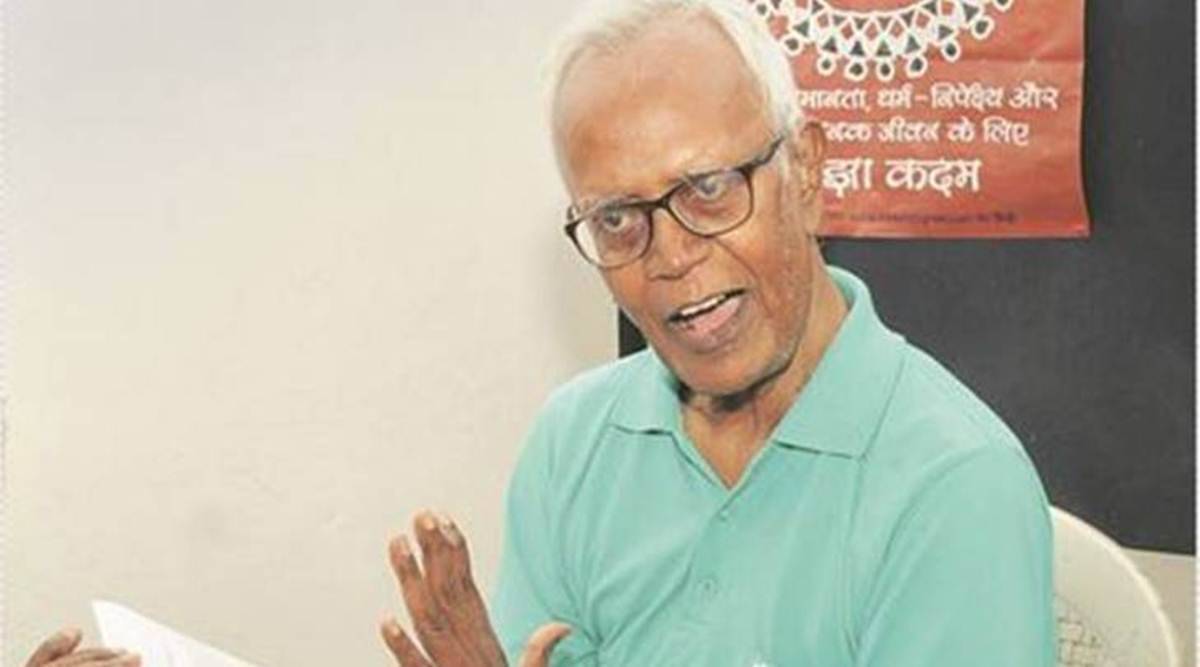Stan Swamy told NIA about documents being unethically inserted in his computer, says colleague
During his interrogation by the National Investigation Agency (NIA) last year, Jesuit priest Stan Swamy, a tribal rights activist and one of the 16 arrested in the Elgaar Parishad case, had informed officials of ‘unethical insertion of documents’ into his computer, a colleague of Swamy’s said on Tuesday.
According to Father Solomon, while being interrogated by the NIA last year, the 83-year old priest had spoken of at least three instances where he was shown documents from his laptop which he had disowned and claimed were inserted. Father Solomon is the director of Bagaicha, an organisation founded by Swamy which works with tribals in Jharkhand.
“On three occasions, on July 28, July 29 and August 6, extracts claimed to have been found on Father Swamy’s computer were shown to him by NIA officials. He had told them that these never existed on his computer. That a computer can be hacked is imaginable for people in their 60s. When I tried to explain this to him… and he is 83, so he was baffled initially and gradually began grappling with the terrifying intricacies of hacking and implanting documents as he was shown these excerpts that were claimed to be in his device,” Solomon said. He was speaking at a virtual press conference held by family members, colleagues and lawyers of the accused.
Solomon also claimed that sentences were added in letters to project that Swamy had links with banned rebel groups.
Swamy was arrested by the NIA in October last year, from Bagaicha in Ranchi, and brought to Mumbai the next day. The NIA filed a chargesheet against him on the same day and claimed that incriminating documents, including propaganda material and literature, were found from his possession.
At the press conference on Tuesday, family members and colleagues of the Elgaar Parishad case accused demanded an independent inquiry into the alleged planting of evidence following a report by US-based digital consultant, Arsenal Consulting. Based on the copies of electronic devices of accused Rona Wilson, seized by Pune Police in 2018 sent by his defence team, the consultant had said that it was “infected with malware” in 2016, two years before Wilson’s arrest, and “incriminating evidence” was planted through it by a hacker.
Wilson has filed a petition before the Bombay High Court, seeking quashing of the FIR and chargesheet in the case as well as an independent probe. The family members and colleagues of the accused reiterated the demand, stating that they should also be granted bail immediately. None of the 16 arrested between 2018 and 2020 have been granted bail by the courts.
Also present in the conference were experts including Jedidiah Crandall, associate professor of the Biodesign Center for Biocomputing, Security and Society, Arizona State University and Sandeep Shukla, professor of computing science and engineering, IIT Kanpur. The two said that a perusal of the digital consultant’s report had shown that the electronic device of Wilson was compromised through a Remote Access Trojan. “It is not exceptional to see the use of such malware, which is done usually for monetary purposes by accessing passwords of a person. The part which is exceptional in this case is the time that the person was monitoring the target (Wilson) and the activity on it, done with an intention to implicate,” said Crandall.
Shukla said that a bare minimum anti-virus software would have found the presence of malware when forensic analysis of the device was conducted.
The Ministry of Home Affairs had said that there was nothing to suggest that — based on the investigation conducted and reports of the forensic experts of Pune (NIA had taken over the case from Pune Police in January 2020) — any evidence was planted.
The High Court is yet to hear Wilson’s plea. Another plea seeking mirror images of Swamy’s devices is pending before the trial court.



